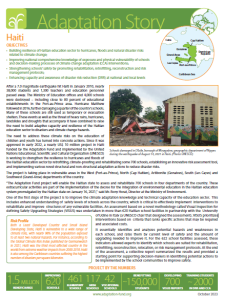Scholars of the school of Jacquin, temporary shelter built by UNESCO after the earthquake of August 14, 2021. (Photo: UNESCO)
[Project Story] Adaptation Fund in Haiti
After a 7.0 magnitude earthquake hit Haiti in January 2010, nearly 38,000 students and 1,300 teachers and education personnel passed away. The Ministry of Education offices and 4,000 schools were destroyed – including close to 80 percent of educational establishments in the Port-au-Prince area. Hurricane Matthew followed in 2016, further damaging a quarter of the country’s schools. Many of these schools are still used as temporary or evacuation shelters. These events as well as the threat of heavy rains, hurricanes, landslides and droughts that accompany it have combined to raise the need to build adaptive capacity and resilience of the Haitian education sector to disasters and climate change hazards. 
The need to address these climate risks on the education of children and youth has turned into concrete actions. Since it was approved in early 2022, a nearly US$ 10 million project in Haiti funded by the Adaptation Fund and implemented by the United Nations Educational, Scientific and Cultural Organization (UNESCO) is working to strengthen the resilience to hurricanes and floods of the Haitian education sector by retrofitting, climate-proofing and rehabilitating some 700 schools, establishing an innovative risk assessment tool, and implementing various novel structural and non-structural adaptation actions to reduce disaster risks.
The project is taking place in vulnerable areas in the West (Port-au-Prince), North (Cap Haitien), Artibonite (Gonaives), South (Les Cayes) and Southwest (Grand-Anse) departments of the country.
“The Adaptation Fund project will enable the Haitian state to assess and rehabilitate 700 schools in four departments of the country. These extracurricular activities are part of the implementation of the decree for the integration of environmental education in the Haitian education system promulgated by the Haitian state on January 16, 2021,” said Mr. Rony Horat, Director at the Ministry of Environment.
One of the first steps of the project is to improve the climate adaptation knowledge and technical capacity of the education sector. This includes enhanced understanding of safety levels of schools across the country, which is critical to effectively implement interventions to rehabilitate and improve structures of any vulnerable facilities. An assessment based on a novel methodology called Visual Inspection for defining Safety Upgrading Strategies (VISUS) was undertaken in more than 620 Haitian school facilities in partnership with the University of Udine in Italy (a UNESCO chair that designed the assessment).
The project will also improve the number of safe storm shelters, at the same time. “After the recent earthquakes and Cyclone Matthew in Haiti, many schools and churches used as shelters in the past during natural disasters were damaged and could no longer receive the victims. With the Adaptation Fund project, hope is reborn. We will have safer shelters to guarantee the safety of displaced families in case of earthquake or violent storms,” said Mr. Serge Semerzier, Director of Civil Protection in Haiti.
Read the full story here.
Attachments
| Attachment | Type | Size |
|---|---|---|
| English | 3 MB |


